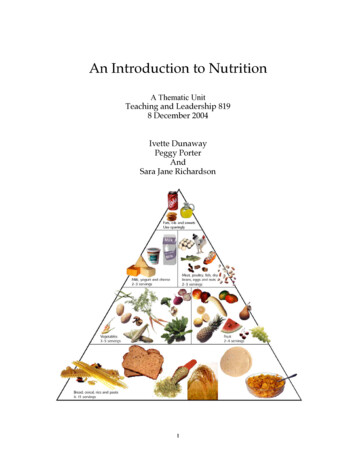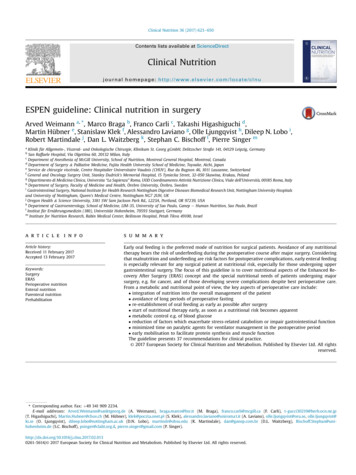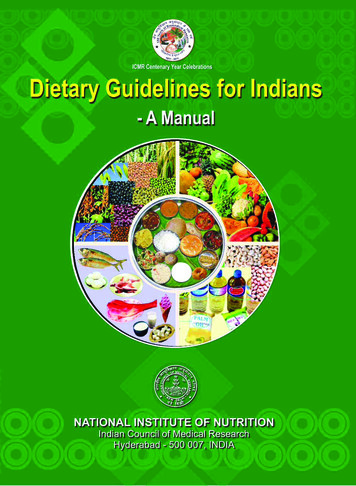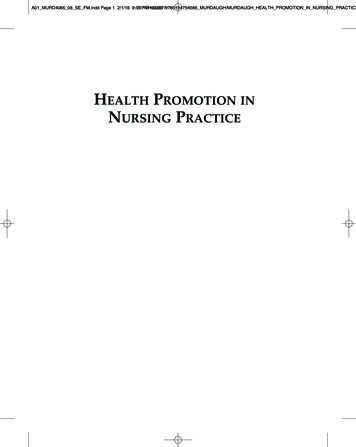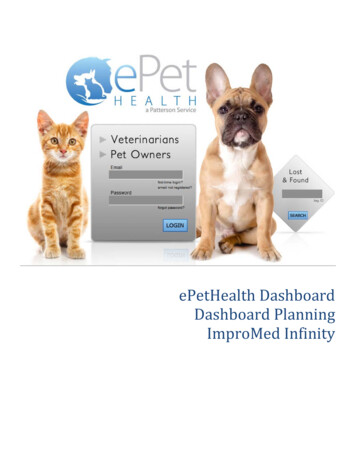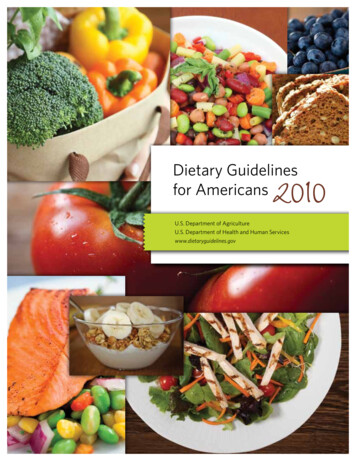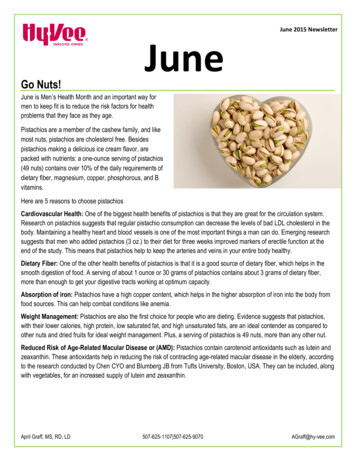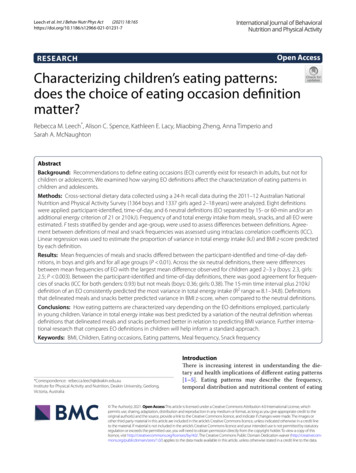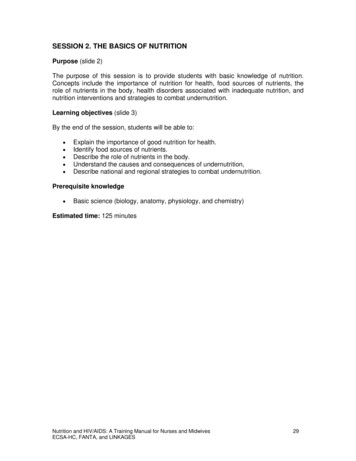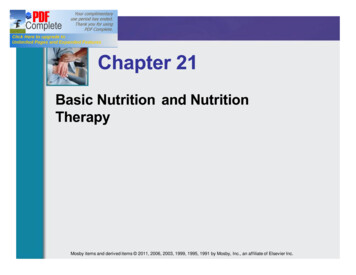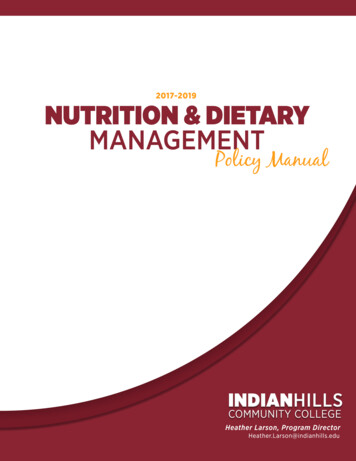
Transcription
WELCOMEWelcome to the Nutrition & Dietary Management programs. We want you to be successful and we arehere to assist you in every way possible. These programs will provide you with a variety of learningexperiences to prepare you for your role in the management of institutional foodservice and nutrition.PROGRAM POLICY MANUALThe purpose of this Nutrition & Dietary Management Program Policy Manual is to serve as a guide for allstudents enrolled in the individual programs. It is a supplement to the Indian Hills Community CollegeStudent Handbook and Planner and the College Catalog. All policies and regulations from the handbookand catalog are to be observed in addition to those outlined in these following pages.Indian Hills Community College is accredited by the Higher Learning Commission, member of the NorthCentral Association and the State of Iowa, Iowa Department of Education. The Certified Dietary Managercourse work within the Nutrition and Dietary Management programs are approved through the followingagency:The Association of Nutrition & Foodservice Professionals406 Surrey Woods DriveSt. Charles, IL 60714(800)323-1908The non-credit Certified Dietary Manager Certificate Program and the Nutrition & Dietary Manager,A.A.S. programs are part of the Health Sciences Division at Indian Hills Community College. The staffand administration of the Health Sciences Division of Indian Hills Community College have developedthis program policy manual.We welcome you and want you to know we are here to assist you in every way possible. We want to youto succeed. It is a privilege to have each of you in these programs.Heather Ware, RD, LDNutrition & Dietary Management Programs1
TABLE OF CONTENTSPageWelcome . 1Table of Contents. . 2Faculty/Staff Directory. . 4Indian Hills Community College. 5Institutional MissionInstitutional PurposeNutrition & Dietary Management Programs. . 6Program Mission StatementCompletion of Programs/GraduationCertified Dietary Manager Certificate . 8Program Goals & DescriptionCurriculumCore Course DescriptionsClinical Laboratory Assistant . 11Program Goals & DescriptionCurriculumCore Course DescriptionsStudent Responsibilities . 14GeneralDress CodeStudent CommunicationsPhysical Examination & ImmunizationsCriminal Background Checks and Drug Screens/Other Tests2
Nutrition & Dietary Management Policies . 19Service WorkAlternate and Clinical Waiting ListOutside EmploymentAttendanceStudent InjuryAcademic IntegrityGradingProgram Probation/Dismissal, Withdrawals, RE-EntryClassroom Electronic Device/Cell PhoneStudent Files/RecordsLeave of AbsencePregnancyHealth Sciences Certifications(Blood Borne Pathogens, HIPAA/Confidentiality, Mandatory Reporting)ProfessionalismAcademic Information. 25Grading/EvaluationsGradesTestingSexual HarassmentClinical Information . 27Rules and RegulationsAttendanceAlternate and Clinical Waiting ListClinical Grading/EvaluationsClinical Fieldwork Perquisites ChecklistClinical AffiliatesAppendices (Samples Only of Signature Documents) . 32Program Policy AgreementAcademic IntegrityConfidentiality StatementIHCC Consent FormConsent for Release of InformationStudent Laboratory Agreements (Safety and Participation)3
FACULTY/STAFF DIRECTORYFACULTY/STAFFHealth Sciences Division:Executive Dean, Career and Workforce Education:Jill BuddeJill.Budde@indianhills.eduAssociate Dean, Health Sciences:Heidi JonesHeidi.Jones@indianhills.eduOFFICE RMPHONERHEC 105641-683-5165RHEC 105641-683-5292Department Chair, Rural Health Education PartnershipMarianna Administrative Staff:Michelle EngleMichelle.Engle@indianhills.edu641-683-RHEC 105NUTRITION & DIETARY MANAGEMENT Programs:Heather Ware, RD, LDHeather.Ware@indianhills.eduRHEC4(MLT, CLA, and PBT)641-683-5311
INDIAN HILLS COMMUNITY COLLEGEINDIAN HILLS COMMUNITY COLLEGE MISSIONIndian Hills Community College changes lives by inspiring learning, diversity, social enrichment, andregional economic advancement.INDIAN HILLS COMMUNITY COLLEGE VALUES Academic Excellence and Student SuccessIntegrity, Relationships, and TeamworkAcceptance, Inclusion, and AccessibilityTradition and CultureInnovation and the Future5
NUTRITION & DIETARY MANAGEMENT PROGRAMSPROGRAM MISSION STATEMENTThe mission of the Nutrition & Dietary Management Programs of Indian Hills Community College isto be an exemplary program graduating highly qualified individuals to fill the employment needs ofinstitutional foodservice operations. The Programs are committed to serving students and nutritionand foodservice operations through guidance, excellent academic instruction and professional trainingutilizing traditional and innovative means while understanding the cultural diversity of individuals,maintaining a student-centered philosophy, striving to make wise use of community and educationalresources and materials. The faculty of the Nutrition & Dietary Management programs is committedto providing quality instruction by preparing the graduate to be employable at an entry level and to besuccessful on the professional certification examinations.ESSENTIAL FUNCTIONSThe applicant/student needs to be adequately informed of all demands and expectations of a programor profession so that he/she can determine his/her ability to meet these expectations. The followingare essential functions of the non-academic demands of the program which all applicants and enrolledstudents of the Nutrition & Dietary Management programs will be expected to meet.Theapplicant/student must be able to:Observation:Participate actively in all demonstrations, exercises, and clinical experiences in the professionalcomponent of the degree.Communication:Communicate effectively and sensitively with patients in order to elicit information, describe dietaryhabits and complete nutritional evaluation.Assess non-verbal communications.Read and comprehend written material is essential in order to correctly and independently followprocedures and policies, and to implement physician diet orders.Effectively and efficiently transmit information and instructions to patients, students, faculty, staff,and all members of the healthcare team.(Communication skills include speaking, reading, and writing, as well as the observation skillsdescribed above, and must utilize the English language.)Psychomotor Skills:Lift twenty pounds and to move light equipment, as might be required in the workplace.Use a keyboard; maneuver, manipulate, adjust, and control lab equipment, instruments and supplies.Intellectual/Conceptual, Integrative, and Cognitive Abilities:Measure, calculate, reason, analyze, synthesize, evaluate, integrate and apply information.Use sufficient and sound judgment to recognize and correct performance and to problem solveunexpected observations or outcomes of food production.6
Behavioral and Social Attributes:Possess the emotional health required for full utilization of his/her intellectual abilities fully, such asin exercising sound judgment, promptly completing all responsibilities, being able to work in andadapt to changing and stressful environment, displaying flexibility, and functioning independently inthe face of taxing workloads, uncertainties, or problems that might arise.Be flexible, creative, and adaptable to change and stress, willing to change, and cooperative with peersand supervisors.Possess compassion and concern for patients and others.Ethical Standards:Demonstrate professional demeanor and behavior and must perform in an ethical, moral manner indealing with peers, faculty, staff, and patients.Possess integrity, commitment, and motivation.Academic Performance:Obtain and correlate relevant information from lectures, seminars, exercises, field work experience,and independent study assignments.Use computer-based examinations to assess and improve educational outcomes of the program.Sit for examinations, both written and oral, complete written assignments, deliver presentations, andperform the required laboratory practice with and without supervision.(Student signature is required for this document. See Appendices.)COMPLETION OF THE PROGRAMS/GRADUATIONThe students who successfully complete the individual program’s requirements will be awarded theappropriate Associate of Applied Science Degree or Certificate. The granting of these degrees andawards is not contingent upon the student’s passing of any type of external certification or licensureexamination.7
Certified Dietary Manager - CertificateCDM Certificate Program GoalsThe Indian Hills Community College Certified Dietary Manager Certificate Program will prepare thegraduate for the skills, knowledge and professional attributes necessary to begin a successful career asan entry-level Certified Dietary Manager (CDM).The CDM Certificate Program provides education through an accelerated non-credit platform to helpmeet the employment needs of institutional foodservice operations. It is the College’s goal to help andmotivate the student to develop his/her optimum level of performance, and gain entry-levelcompetency. As a graduate of the CDM Program the student will be prepared to work within the healthcare team to provide quality health care and maintenance of optimum health for all individuals of thesociety.CDM- Certificate DescriptionThis non-credit certificate program prepares students for the national ANFP credentialing boardexamination and is designed to provide educational experiences which prepare the student for aprofessional career in the healthcare system. The program requires a combined 120 classroom andindependent study hours and 150 hours of field experience in the study of nutritional concepts such asnutrition screening, nutrition assessments, modified diets, and foodservice management concepts offoodservice safety, sanitation & food protection, HACCP guidelines, personnel & policy management,and communication within a foodservice department.CDM-Certificate Program OverviewThe Indian Hills Community College CDM-Certificate program prepares the student to manageinstitutional foodservice operations. This program is up to one year in length and includes 26 weeks ofclassroom & independent study, followed up to 26 weeks to complete 150 hours of field experience witha Registered Dietitian Preceptor. Students who complete the program are awarded a Certificate fromIndian Hills Community College. Graduates typically find employment in hospitals, long term carefacilities or school food service; however, opportunities for employment also exist in the community.Graduates are eligible to take the ANFP professional certification examination for Certified DietaryManagers.8
CDM CERTIFICATE PROGRAM COMPETENCIES(Adapted from ANFP program guidelines)After completing the Indian Hills Community College CDM & Nutrition & Dietary ManagementPrograms the graduate will be able to: Use the building blocks of nutrition and describe the process of digestion, absorption,and the utilization of nutrientsTranslate nutrition science into food intakeReview body systems & disease processes and medical nutrition therapy (mnt)interventionsDocument nutrition information in the medical recordsObtain routine nutrition screening data, interview for nutrition related information,assist clients with food selection, and use nutrition education materials & adaptteaching to clients’ educational needsIdentify nutrition problems and client rightsParticipate in client care conferences, communicate client information to other healthprofessionals and implement physician’s dietary ordersApply standard nutrition care procedures, review effectiveness of nutrition careModify standard menusModify diet plans, and manage special nourishments and supplemental feedings, foodallergies, complimentary medicine, and alternative therapies in nutritionManage personnel to ensure compliance with safety and sanitation regulationsManage purchasing, receiving, storage, and distribution of food and supplies followingestablished sanitation and quality standardsProtect food in all phases of preparation using HACCP guidelinesManage physical facilities to ensure compliance with safety and sanitation guidelinesSupervise the production and distribution of food including managing standardizedrecipes and specify standards and procedures for preparing food and monitoring mealserviceManage department personnel including define personnel needs and job functions,interview, select, and orient employees, provide ongoing education, develop andmaintain employee time schedules and assignmentsManage goals and priorities for department, implement required changes infoodservice department and implement continuous quality improvement proceduresfor foodservice departmentManage professional communicationsManage a budget including implementing cost effective procedures, managing revenuegenerating services and assisting in the purchasing processPlan and budget for improvements in the department design and layout and preparespecifications for capital purchases.9
CDM- Certificate CurriculumCat. #TermCoursesXxxxXxxxxXxxxxNutrition for Certified Dietary ManagersFoodservice Management for Certified Dietary ManagersFieldwork for Certified Dietary MangersWeeks10 weeks (5 lectures)16 weeks (8 lectures)\Self-paced not to exceed6 monthsNOTE:1.2.Must have a 78% or better in all CDM independent study coursework, exams and field experiences.Health Science Certifications (HIPAA, Blood Borne Pathogens, and Child and Adult Abuse MandatoryReporting) must be completed by week 3 of initial core course for each Nutrition & Dietary Managementprogram.Degree: Certificate, Certified Dietary ManagerProfessional Certification Eligibility: Certified Dietary Manager, CDM (ANFP)CDM-Certificate CORE COURSE DESRIPTIONSNutrition for Certified Dietary Managers10 weeks (5 lectures)This course examines the basic concepts & science of nutrition for foodservice professionals,using building blocks of nutrition, the process of digestion, medical nutrition therapyinterventions, documentation of nutrition information in the medical records, nutritionscreening and interviewing, food selection, use of nutrition education materials, working withthe healthcare team through the standard nutrition care process.Foodservice Management for Certified Dietary Managers16 weeks (8 lectures)This course examines food safety and sanitation regulations & HACCP guidelines in relationto institutional foodservice, and oversight of institutional foodservice operations includingmenu modification, recipe standardization, food production and delivery, personnel andhuman resource management, budgets, communication, professional development, goal &priority development for continuous quality improvement within institutional foodserviceoperations.Fieldwork for Certified Dietary MangersSelf-paced not to exceed 6 monthsThis course requires 50 hours of supervised experience in institutional food serviceoperations, 50 hours of supervised experience in food service department management and50 hours of Registered Dietitian supervised experience in nutrition patient care.10
Nutrition & Dietary Management – AASNutrition & Dietary Management Program DescriptionThe Indian Hills Community College Nutrition & Dietary Management Program will prepare thegraduate for the skills, knowledge and professional attributes necessary to begin a successful career asan entry-level Certified Dietary Manager (CDM), as well as to gain skills related to the projectedFuture Education Model, including skills in supporting NDTRs and RDNs in community settings andwork with individuals in their homes focusing on nutrition and health promotion, assisting inmonitoring plans of care, collecting basic assessment data, demonstrating food preparation and foodlabel reading skills and helping build relationships in the community. Application for programaccreditation through ACEND will occur after the Future Education Model is released in Fall 2016.The Nutrition & Dietary Management Program provides education at the associate degree level to helpmeet the employment needs of institutional foodservice operations. It is the College’s goal to help andmotivate the student to develop his/her optimum level of performance, and gain entry-levelcompetency. As a graduate of the Nutrition & Dietary Management Program the student will beprepared to work within the health care team to provide quality health care and maintenance ofoptimum health for all individuals of the society.Nutrition & Dietary Management Program Goals1.Apply basic knowledge, principles, and concepts, in order to/and perform as a competent,entry-level Certified Dietary Manager and an assistant to NDTRS & RDNs in the community.2.Apply critical/analytical thinking, interpretive, and problem solving skills as appropriate for aCertified Dietary Manager and an assistant to NDTRS & RDNs in the community.3.Utilize effective and appropriate communication.4.Maintain professional, legal, and ethical standards of practice.5.Develop an appreciation and awareness for professional growth and lifelong learning.6.Provide the area healthcare communities with graduates possessing the attitudes, knowledge,and skills necessary to function as a competent and an assistant to NDTRS & RDNs in thecommunity.Nutrition & Dietary Management – OverviewThe Indian Hills Community College Nutrition & Dietary Management Program prepares the student tomanage institutional foodservice operations. This program is 6 terms in length and requires thestudents complete 150 hours of field experience with a Registered Dietitian Preceptor. Students whocomplete the program are awarded an Associates of Applied Science Degree from Indian HillsCommunity College. Graduates typically find employment in hospitals, long term care facilities orschool food service; however, opportunities for employment also exist in the community. Graduates areeligible to take the ANFP professional certification examination for Certified Dietary Managers. Studentwill gain competencies, in addition to those of the CDM, in relation to the new two-year associates levelcommunity health worker, as further details become available from ACEND.11
Nutrition & Dietary Management CurriculumCat. #TermCreditsCoursesBIO 175BIO 176ENG 105TBDBUS 1021 – FallHuman AnatomyHuman Anatomy LabComposition 1Nutrition for FoodserviceIntroduction to Business31333CoursesBio 178, 179Bio 179TBDHCM 101HSC 1132 – WinterHuman PhysiologyHuman Physiology LabMedical Nutrition TherapySafety & SanitationMedical Terminology31312CoursesSPC 101TBDTBDCSC 1053 – SpringFundamentals of Oral Communication 3Management & Leadership in Foodservice 3Foodservice Systems & Production 3Computer Essentials1CoursesTBDMAT 120PSY 111PEH 1154 – SummerCDM Field ExperienceCollege AlgebraIntroduction to PsychologyWellness Education2.5333CoursesENG 106TBDTBD5 – FallComposition 2Food & Culinary ScienceLifecycle Nutrition333CoursesPSY 121TBDHSC 2126 – WinterDevelopmental PsychologyCommunity NutritionPathophysiology333NOTE:1.2.Must have a 78% or better in all Nutrition & Dietary Management core coursework.Health Science Certifications (HIPAA, Blood Borne Pathogens, and Child and Adult Abuse MandatoryReporting) must be completed by week 3 of initial core course for each Nutrition & Dietary Managementprogram.Degree: Nutrition & Dietary Management, A.A.S.12
Professional Certification Eligibility: Certified Dietary Manager, CDM (ANFP)NUTIRITION & DIETARY MANAGEMENT CORE COURSE DESRIPTIONSIntroduction to Nutrition for Foodservice ProfessionalsThis course examines the basic concepts & science of nutrition for foodservice professionals andteaches the student to use nutritional principles to evaluate and modify menus and recipes, and toaccommodate basic dietary needs.Medical Nutrition TherapyThis course is designed to provide educational experiences which prepare the student for aprofessional career in the healthcare system. The course examines basic nutrition, using buildingblocks of nutrition, the process of digestion, medical nutrition therapy interventions, documentationof nutrition information in the medical records, nutrition screening and interviewing, food selection,use of nutrition education materials, working with the healthcare team through the standard nutritioncare process.Safety & SanitationThis course introduces the basic principles of safety and sanitation and their relationship to the foodservice industry. Topics include the sanitation challenge, the flow of food through the operation, cleanand sanitary facilities and equipment, accident prevention and crisis management, and sanitationmanagement.Management & Leadership in Foodservice:This course examines personnel and human resource management, budgets, communication,professional development, goal & priority development for continuous quality improvement withininstitutional foodservice operations.Foodservice Production & SystemsThis course examines food safety and sanitation regulations & HACCP guidelines in relation toinstitutional foodservice, and oversight of institutional foodservice operations including menumodification, recipe standardization, food production and delivery.Certified Dietary Manager Field Experience:This course requires 50 hours of supervised experience in institutional food service operations, 50hours of supervised experience in food service department management and 50 hours of RegisteredDietitian supervised experience in nutrition patient care.Food & Culinary Science:This course provides an introduction of chemical and physical properties of food, and explores howingredients, processing, packaging, distribution and storage influence food quality and safety.Lifecycle Nutrition:This course examines nutrition throughout the lifecycle including growth, development, and normalfunctioning through each stage of life, in addition to age related nutrition ailments.Community Nutrition:This course introduces the various components of community nutrition programing, includingprogram planning, policies, resources, and community nutrition issues. The course provides studentswith the tools for developing community nutrition programs for various demographics.13
STUDENT RESPONSIBILITIESGENERALEntry into a professional program entails responsibilities as well as rights. The following outlinesstudent responsibilities in all the Nutrition & Dietary Management programs. Included areprofessional responsibilities for being accountable in practice and respecting others and one’s self, aswell as responsibilities for being an active participant in the learning process and for one’s role as alearner.Students in the Nutrition & Dietary Management programs will be expected to:Didactic/Classroom: Attend classes and lab experiences regularly, including online classroom sessions Participate in class and small group discussion Assume responsibility for own learning and development by:-coming prepared for class and lab activities.-completing assignments on time with written work being done legibly and in the properformat.-accepting constructive criticism and supervision by others and using suggestions for growth.-monitoring own progress in meeting course objectives and seeking out needed learningexperiences and instructor assistance-using appropriate resources and references to increase knowledge base and improveperformance.-scheduling appointments with instructor(s) for assistance with class assignments andobtaining materials that were missed due to any absence. Be accountable for own judgments, actions or non-actions, and choices. There will be nooutbursts of anger, out-of-control behavior, arguing, or swearing, to name a few examples, in theclassroom. Follow all safety rules and practices. Adhere to the Health Insurance Portability and Accountability Act (HIPAA) during classdiscussions, clinical experiences and clinical practicum rotations. Call the course instructor if you are going to be absent or late. Make arrangements for and complete make-up assignments after any missed class. Please notethat some labs may not be able to be made-up. It is the student’s responsibility to contact theinstructor about making up missed labs or assignments. It is also the student’s responsibility toobtain any materials missed due to his or her absence. See individual course syllabi for specificrequirements. All documents for program courses must be submitted using Word, Power Point, or othercommonly accepted software programs. Follow appropriate channels of communication to resolve concerns over testing and evaluationprocedures or classroom activities.(Instructor Program Director Department Chair Dean)14
Fieldwork ExperienceA vital element of all the Nutrition & Dietary Management curricula is the fieldwork experience (i.e.,clinical rotation). Students may request geographical locations, but the program director and facultymake all final placement decisions.Clinical affiliation provides an opportunity for students to gain experience in an institutionalfoodservice operation under the supervision of a Registered Dietitian. You will not be expected tofunction independently as an additional staff member, but you will be expected to perform routine lprocedures with minimal supervision that are expected for your level of education.Dietitians & Foodservice professionals do not expect to teach basic procedures of theory. Thestudent must demonstrate this ability through satisfactory completion of all didactic coursecompetencies and skills prior to any clinical experiences. If a student has not satisfactorilycompleted course work and demonstrated the ability to perform required procedures, he or she willnot be allowed to progress on to a clinical assignment. The instructor must be sure that all studentswill be safe practitioners at the level expected for students in the final phase of the educationalprogram.It is the student’s responsibility to assure that all requirements have been completed and theappropriate signatures have been obtained.Clinical ExpectationsClinical practicum evaluations will be based on performance in the clinical setting under thesupervision of the staff. Students will be expected to apply the knowledge and skills gained fromprevious didactic course work, combined with professional attributes. During clinical practicum, thestudent will be expected to:1. Behave/perform as a professional bya. Participating in clinical practicum on assigned days at assigned times. If the student is illor has an emergency that prevents him or her from being at the clinical site, the studentmust notify both the Health Occupations Office and the clinical instructor. A studentmust have the required clinical hours to graduate from the program. Absences will meanmaking up these hours at the end of the semester at a time arranged with the clinical sitesupervisor/instructor.b. Performing nutrition analyses & foodservice tasks with utmost care, accuracy andquality.c. Following written/verbal procedures and instructions.2. Safeguard the patient in the clinical setting by:a. recognizing self-limitations.b. seeking out the physician/supervisor when unsure of self or when unable to followdirections/guidelines given.c. reporting errors or mistakes and following through with the needed action for remedy.d. adhering to hospital policies, procedures, and routines.e. recording and reporting patient care data accurately.f. adhering to the Health Insurance Portability and Accountability Act (HIPAA) regardingpatient confidentiality.3. Accept constructive criticism from supervisor and utilize suggestions for growth.4. Develop attributes that reflect professional conduct and respect for one’s self and others, toinclude:a. protect the patient’s right to privacy by maintaining strict confidentiality.b. respect the human dignity and uniqueness of others regardless of social or economicstatus, personal attributes, or nature of health problems.c. listen attentively and courteously when others are speaking.d. demonstrate poise, tact, and self-control when communicating with others.15
e. express self clearly and accurately both verbally and in written work.f. offer assistance to others rather than waiting to be asked.g. project a professional image/attitude during clinical activities.5. Adhere to Universal/Standard Precautions and OSHA Bloodborne Pathogen Standardsincluding use of Personal Protective Equipment (PPE’s) and adherence to agency ExposureControl Plans.Report any exposure incident to clinical supervisor and to the program director or instructor.Student Conduct and Disciplinary ActionProgram students, like all students at IHCC, are responsible for maintaining standards and adhering toregulations adopted by the college. Unsafe, unprofessional, dishonest or disruptive conduct may resultin failure
using building blocks of nutrition, the process of digestion, medical nutrition therapy interventions, documentation of nutrition information in the medical records, nutrition screening and interviewing, food selection, use of nutrition education materials, working with the healthcare team thro
